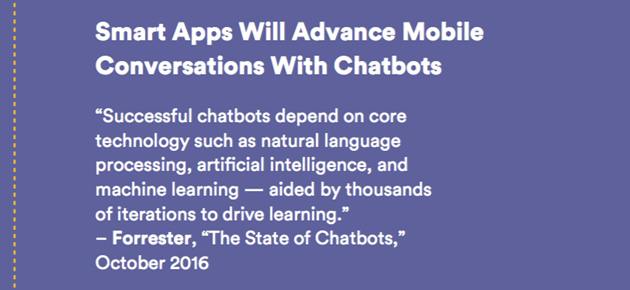2016 was a big year for mobile marketing, but 2017 will be even bigger.
A few tech trends looming on the horizon are going to make an impact on the work of all mobile marketers—whether they know it or not.
Predictive analytics, chatbots, and intelligent marketing automation are going to dominate the coming year in mobile marketing, according to research from Leanplum (my company).
We'll discuss each in detail to explain how mobile marketers will be affected and what they can do to stay ahead.
Predictive Analytics

What Is It?
Predictive analytics is an emerging discipline that incorporates analytics with machine-learning technology. By collecting behavioral data from mobile app users, predictive analytics platforms can make educated guesses as to what a person might do next.
For example, a dating app could use someone's search history to find matches they're more likely to accept. That's exactly what Tinder does, according to Jeffrey Morris, its director of product management and revenue. The company uses predictive analytics to derive individual user preferences from trends and patterns, enabling the app to deliver successful matches.
Why Is It Important?
Analytics is already a large part of the mobile marketer's job, and predictive analytics will rightly earn its place in the mobile toolkit. Essentially, this technology makes traditional analytics actionable at scale.
Instead of poring over data to manually create campaigns, marketers will increasingly rely on machine-learning to automatically spot patterns in user behavior. The result: marketing campaigns will be able to behave intelligently at scale, delivering content that's personalized to users' tastes.
Chatbots

What Is It?
Like a small-scale version of Apple's Siri or Amazon's Alexa, chatbots are conversational AI programs that serve a specific function within an app. They're often used for customer service. For example, chatbots can direct users to the appropriate page and question of an FAQ instead of making users navigate to the page on their own.
Some chatbots go beyond traditional customer service roles to become true personal assistants. Slack offers a powerful example.
Slackbot, the chatbot that greets all new users when they first sign in to Slack, continues to offer helpful tips long after the onboarding process is complete. The bot automatically lists channels that you don't read often, in case you want to leave them; it pings you when you set a reminder; it even tells you the wi-fi password. The bot is a general-purpose assistant that improves Slack's in-app experience.
Why Is It Important?
For marketers, chatbots provide an opportunity to increase engagement without coming across as pushy. Although traditional messaging channels, such as push notifications and email, are demonstrably effective, marketers must take care to share content that's value-adding rather than self-serving. And, even then, some mobile users won't opt in to push notifications.
Chatbots aren't just a good customer service tool, they help marketers interact with users in a more friendly, value-adding way. As with the Slackbot example, bots can teach users new things about their usage habits, potentially encouraging engagement in the process.
Intelligent Marketing Automation

What Is It?
Marketing automation, in general, is the process of using software to scale your marketing efforts: It's easy for an email marketer to write a personalized email to a single customer, but it's impractical to do it for 1,000 customers.
Traditionally, the only way to reach such a wide audience at scale was by blasting a generic message to the entire list. Now, with marketing automation, users can customize templates with fields that are automatically filled in with personalized data. Consider those emails that refer to you by name—a perfect current example of personalization at scale via marketing automation.
Intelligent marketing automation is a step up; modern platforms personalize at a deeper level than name and location. Effective automation platforms integrate with analytics to deliver messages based on a holistic view of the user, not just a snapshot.
Why Is It Important?
Overall, people employ marketing automation to boost user retention. With so much competition, it's rare for an app to retain users purely through its own merits. The average 90-day retention rate is only 1.9%. That means most users will leave your app after a few months, even if they've enjoyed the experience.
To combat that challenge, marketers have taken to messaging campaigns that span the entire user lifecycle. From onboarding to conversion, intelligent campaigns automatically send messages and prompts that increase engagement every step of the way.
In 2017, intelligent marketing automation will continue empowering mobile teams to drive more engagement across the user lifecycle.
Are You Ready for 2017?
In the end, trends matter only insofar as they affect our daily lives. Right now, mobile marketing technology is so prevalent that it's going to have an impact on everyone in the industry. Those who keep up will have a competitive edge in the coming year.
To summarize, here's what mobile marketers need to prepare for in 2017:
- Predictive analytics, which will enable dynamic content that's personalized to individual users
- Chatbots, which will bring customer service into the realm of AI and reduce friction in the in-app experience
- Intelligent marketing automation, which will take traditional marketing automation one step further by empowering lifecycle campaigns that draw from all available data and events, not just basic user attributes
Is your marketing team ready for 2017? If the answer is "no," you know what you need to work on.




